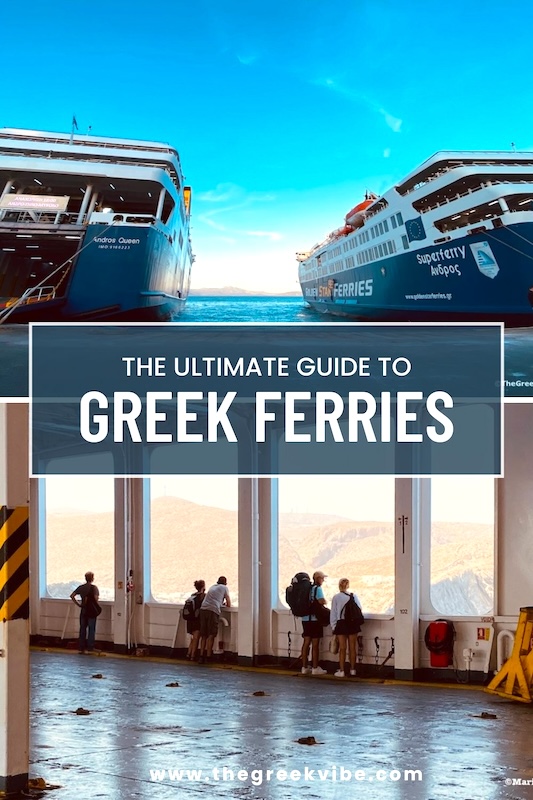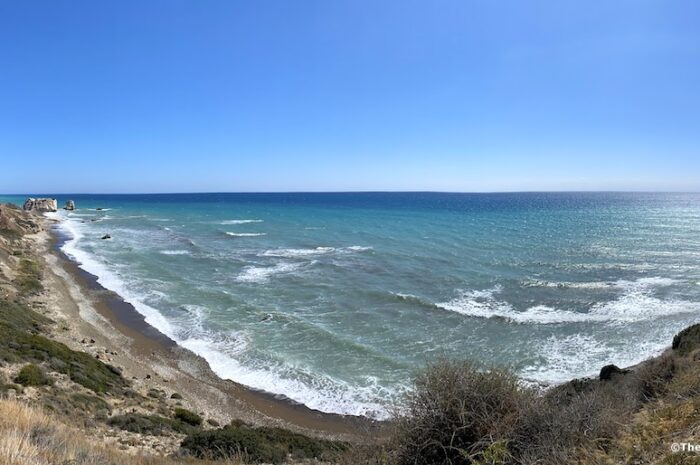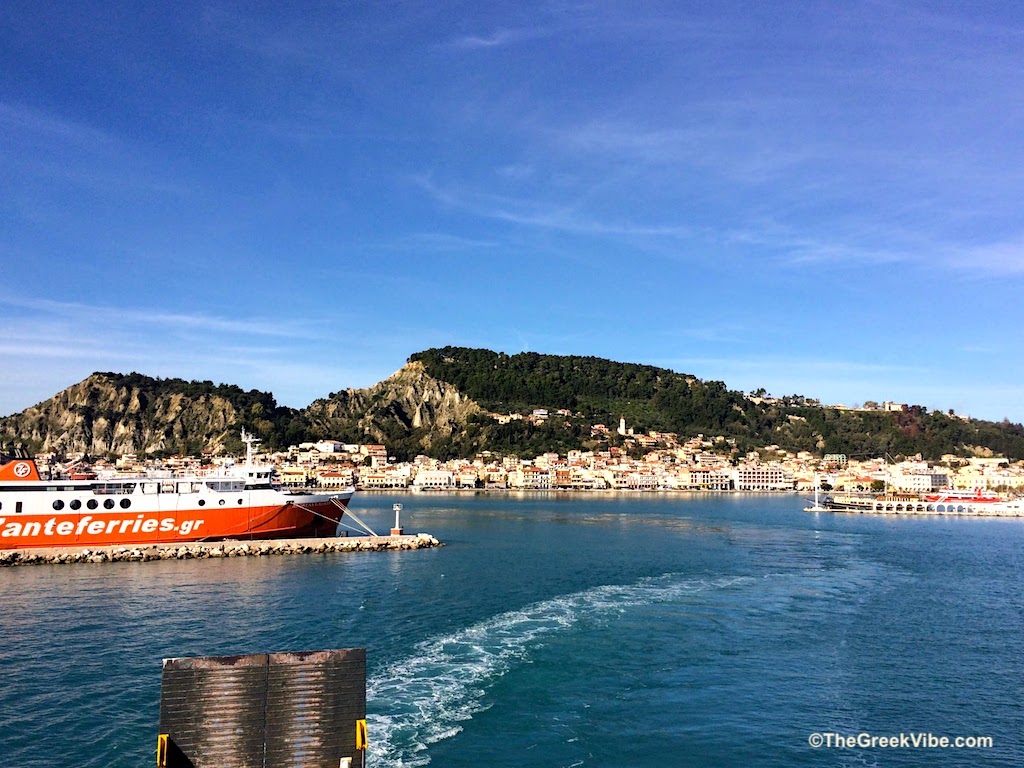
For us Greeks, traveling by ferry to the islands is something we know and are used to. Practice every summer makes perfect. But for tourists visiting Greece, mastering the Greek ferry experience may seem confusing if not incomprehensible.
Even for me, understanding Greek ferries took some time. Thankfully, after three decades of vacations, summers and assignments to the Greek islands, I can share with you all there is to know about getting around the Greek islands by ferry in order to make your vacation to Greece as smooth as possible. Booking platforms don’t always explain the experience, and guidebooks can feel outdated.
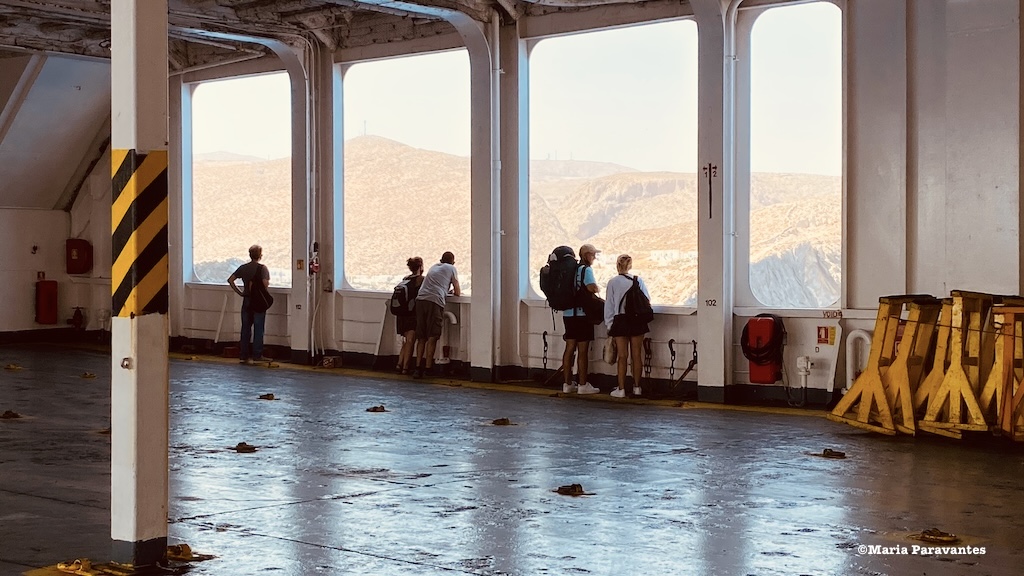
First of all, Greece’s ferry network is one of the most impressive in the world, and Greek captains are renowned for their skill. However, do not expect the organized service that you may have in your country and do not compare with air travel.
If you’re planning a trip to the Greek islands, chances are you’ll be hopping on a ferry or maybe several particularly those of you keen on doing some island hopping.
So, here are the questions you’ve asked and the answers on how to choose a ferry in Greece.
Not all Ferries Are the Same
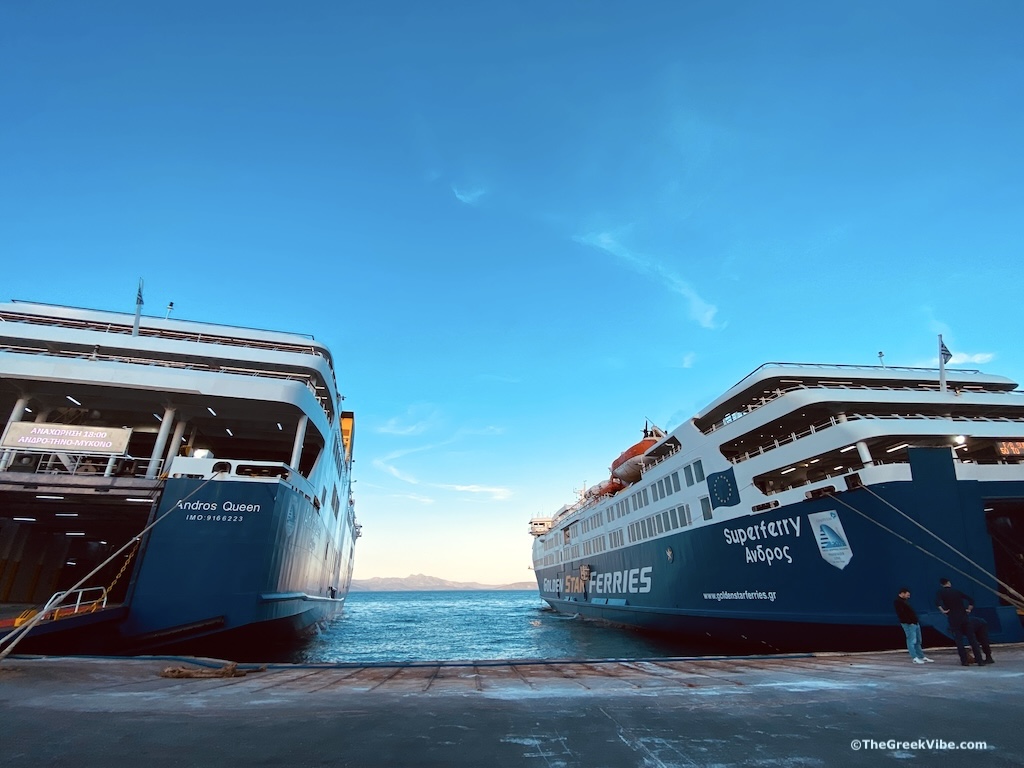
First up, not all ferries are the same. I know many of you wished you had known this before you booked. Some are faster than others (which is what should concern most of you).
Types of Ferries in Greece
➣ Conventional Ferries
- These ferries are big and slow.
- They can carry cars, trucks, and lots of people.

- They are great for longer trips and if you want to sit on the deck, enjoy the sun and breeze with a coffee and just watch one by one the islands go by. Up until a few decades back (and still now for many Greeks) these were the primary mode of transportation. It took locals and travelers from far-off islands like Folegandros 24 hours to get there… today it’s still long but now at least it’s around 8 hours.
- These ferries also have shops, restaurants and cafeterias
- Ferry fares are cheapest on these ferries
- The ride, yes long, is much smoother. Due to size, these are the last ferries to be in rough waters when the weather is bad
I remember most of us tourists bringing sleeping bags and spending the night on the deck until we reached or dream island!
► How To Pick The Greek Island That’s Perfect For You
➣High-Speed Ferries (Sea Jets, Catamarans and Hydrofoils)
- High-speed ferries are much faster and reach the same islands sometimes in half the travel time of a conventional ferry.
- That said, ferry fares are more expensive.
- Usually these ferries don’t transport many if any vehicles
- Seating is mostly inside, no decks for dreaming
- Accessible to people with disabilities
- Expect a smoother ride on high speed ferries but in windy conditions trust me you’ll feel the bumps! Also, these are the first to cancel if the wind gets crazy
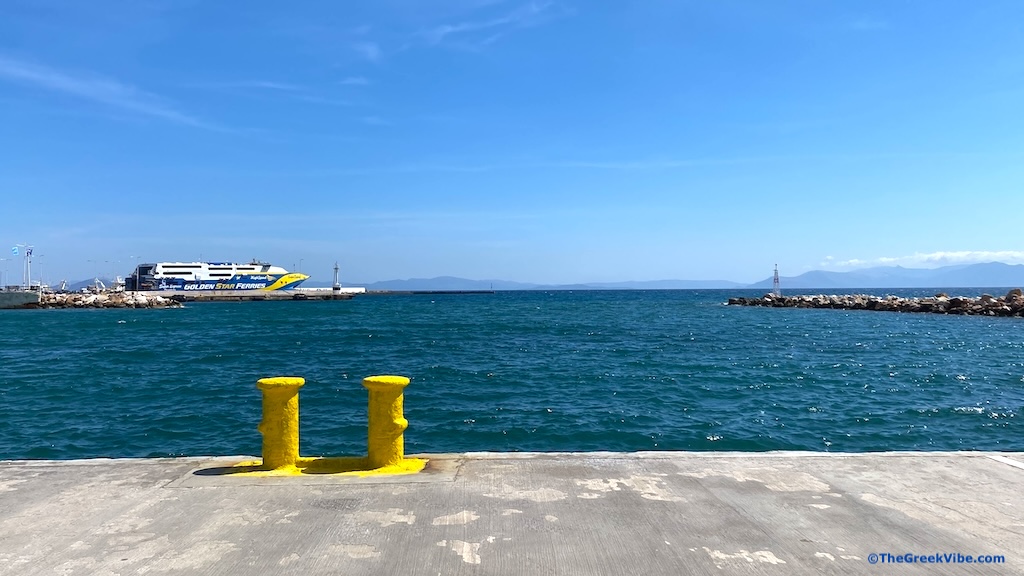
➣ Flying Dolphins and Flying Cats (Smaller Hydrofoils)
I love these names! And if you see them, you’ll understand why. Flying Dolphins don’t even look like dolphins, but more like flying insects, but I assume for marketing purposes it sounded romantic. Flying Cats meanwhile are sleek and cool.
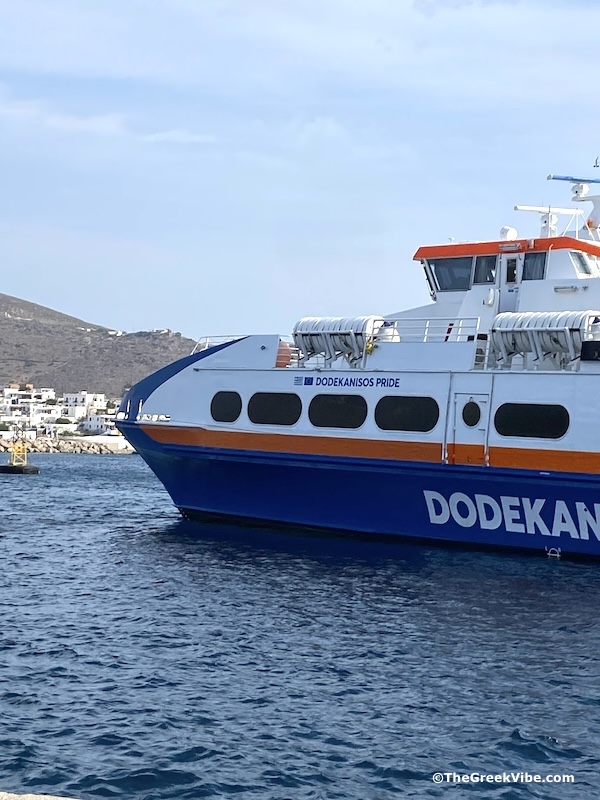
- Flying Dolphins or Cats are very small so they fill up fast
- They are super-fast, which means you get to the island of your dreams quickly and hassle free
- Seating is inside and there is less space for luggage
- Exciting for kids
- Like high speed ferries, it’s a bumpy ride in windy conditions. And Flying Dolphins/Cats are also the first to cancel in high winds
- Accessible to people with disabilities
- Flying Dolphins/Cats are the most popular ferry option for trips to islands near Athens, the Saronic Gulf like Aegina, Poros, Hydra, and Spetses.
➣ Local Ferries
If you visit the Dodecanese Islands, for instance, you’ll discover an entire local network operating frequent routes to and from the islands
- They connect smaller islands like Patmos with Lipsi or Lipsi with Leros etc
- These have more frequent schedules running however on “Greek island time” so you will have to ask a local or a local agency about times and dates. Some have really poor or outdated websites so don’t rely on that.
- Accessible to people with disabilities
- Some local ferries may still only accept cash so be prepared
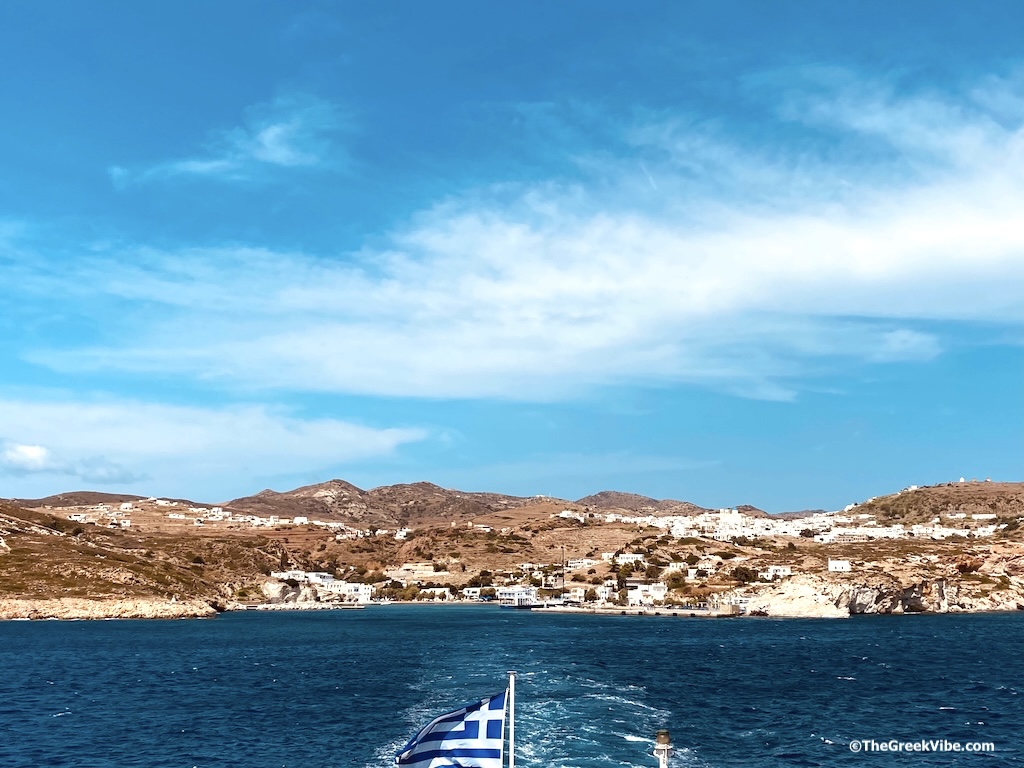
➣ Ro-Ro Ferries
Also knowm as roll on/roll off ferries, these boats allow drivers to drive on and even sit in their cars if they wish and are ideal for local island or island-mainstream connections
- Used for short distances between the mainland and some islands like from Galatas to Poros, or from Mantoudi (Evia) to Skiathos or for connecting parts of islands like Lixouri with Argostoli on Kefalonia.
- They are usually very small, open so you can sit outside, and offer the bare essentials
- Accessible to people with disabilities
➣ Tourist boats
You’ll probably take a tourist boat in Greece when you want to take a tour of the island or just visit a remote beach.
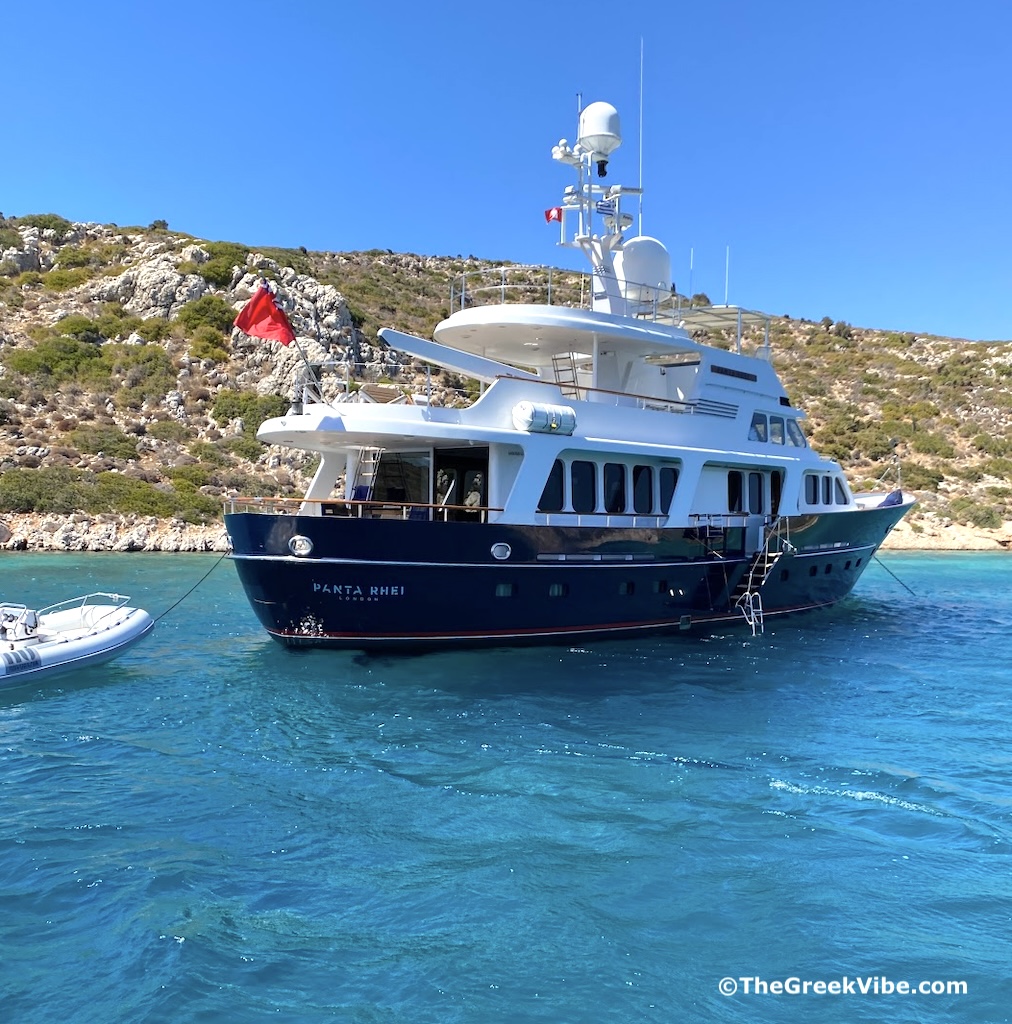
- These are usually owned by locals some formerly or currently fishermen
- The are open and fun to ride in
- Fit about 20-30 people. Some are much bigger
- They offer day trips and tours for a price
- Many are well organized with websites where you can book online but I suggest you just visit the port. Owners know the weather and if a trip is possible. The boats will have a sales point in front of their docking position and a V-shaped sign with the times and beaches or islands it will visit. Ask about the price. If you pay in cash, they may give you a better deal. Just be sure to ask.
- Most of these boats are not accessible to people with disabilities
➣ Water Taxis
Water taxis are ideal for getting to beaches, other islands near your destination or to the mainland, fast
- The offer trips to places that aren’t regularly serviced
- The top reason to take a water taxi is if you’re short on time or are late to your best Greek friend’s wedding, for instance! They are super flexible timewise
- Find a water taxi owner at the port
- The cost is much higher depending on route and number of passengers. Make sure to agree on a price before your trip and whether it will be round trip.
Maria’s Ultimate Greek Island Ferry Guide
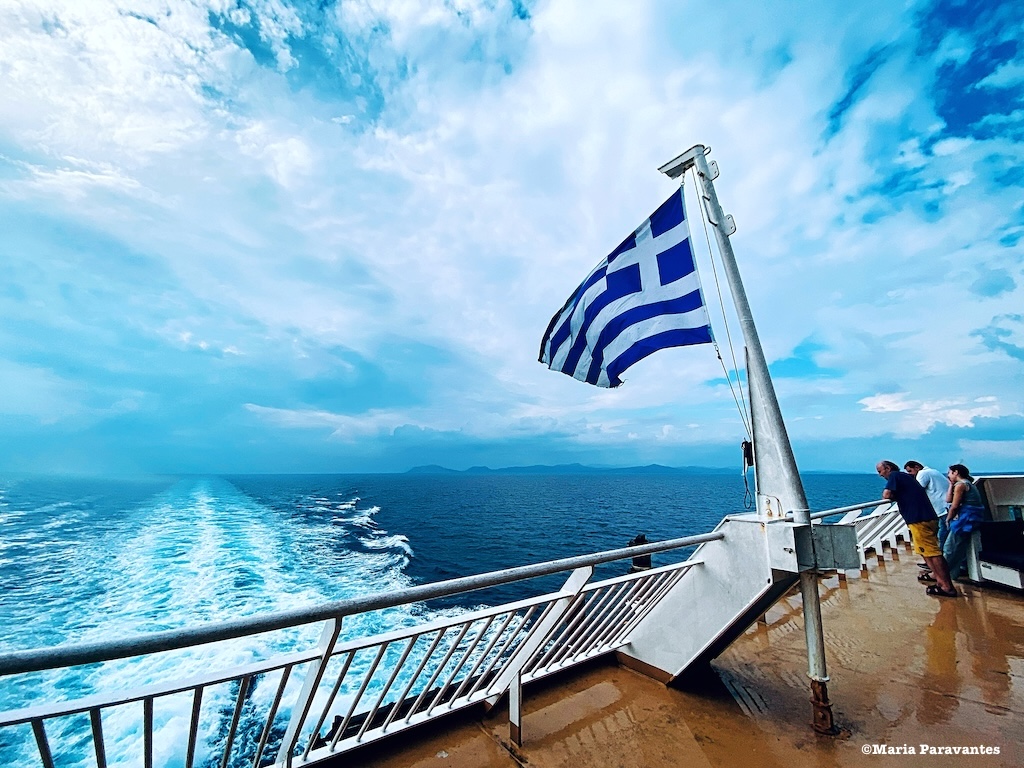
Q: When is the best time to book my ferry tickets to the Greek islands?
A: In summer (especially during peak summer season (July and August), it’s a good idea to book at least a few weeks in advance especially for popular islands like Mykonos, Paros, Santorini, as well as Crete, although they have larger ferries. For shoulder season or less popular islands, a few days ahead is fine.
Q: Do I need printed tickets, or can I use my phone?
A: To be honest, always have a printed copy of your ticket with you. It’s much easier. Although most Greek ferry companies now accept e-tickets with QR codes, you never know what may go wrong. Also a few smaller operators still require a physical boarding pass especially at small islands. So better safe than sorry.
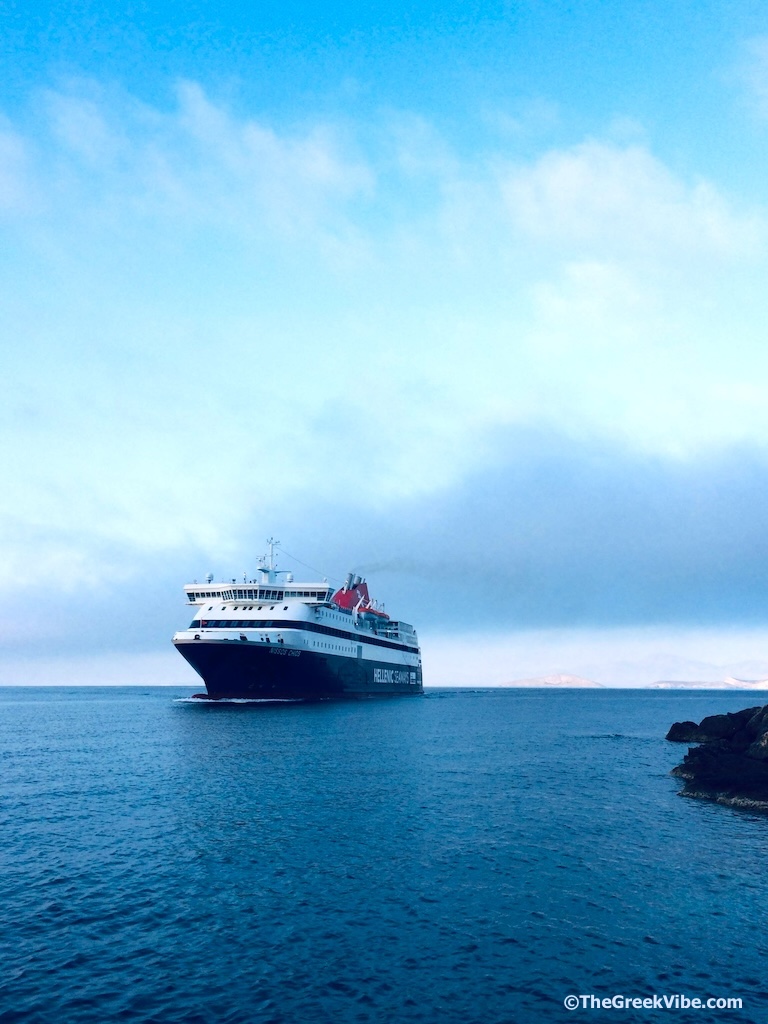
Q: Can I book on the same day I travel?
A: Yes, for many routes. Do not try to do this in August, however, or in winter. August is vacation month for Greeks so ferries are packed and fully booked. Off season, ferry services slash their schedules. Local agents can help, but availability isn’t guaranteed last minute.
Q: How early should I arrive at the port?
A: If you have no vehicle, being there about half an hour early is fine. Make sure to factor in the possibility of traffic when getting to the port and the time to find your gate. Piraeus is a large port and especially in the summer – July and August – it gets chaotic. If you have a vehicle be there about 45–60 minutes early.
If you’re on an island, make sure to be there half an hour ahead. Especially on small islands, the ferries can literally board passengers and leave in minutes! Many have lost their ferry thinking they could grab a coffee or a snack before it departs! Even if you don’t see it on the horizon, be there!
Q: What should I do if there are delays or cancelations?
A: We may have landed on the moon and Mars but we still can’t control the weather. This is particularly true in Greece, and mainly in the summer, when we have the strong “meltemi” winds, which mostly affect the Cyclades islands in July and August. That said, yes, delays may happen as everywhere in the world, either due to weather or port traffic.
Should this happen, contact – or better yet visit – a ticket agency and rebook or get a refund. I know that it can be terribly frustrating especially if you’ve come from far away. Agents will likely book you on the next available ferry weather permitting. Ferry operators in Greece know this so most offer flexible rebooking options. Rule of thumb: Don’t schedule ferries too close to flights.
Q: Can I island-hop using one ferry operator?
A: Great question. The answer: not always. For the most part, each Greek island network has its own company running its routes. So basically there are companies specializing in Ionian islands routes, Crete, the Dodecanese, the Cyclades etc. This means that you will have to mix and match ferry operators for your Greek island hopping trip. This can be tricky. The best way to go about it is to get the help of a travel agent unless you’re really tech savvy. You could also check out Ferryscanner’s multiple route booking option.
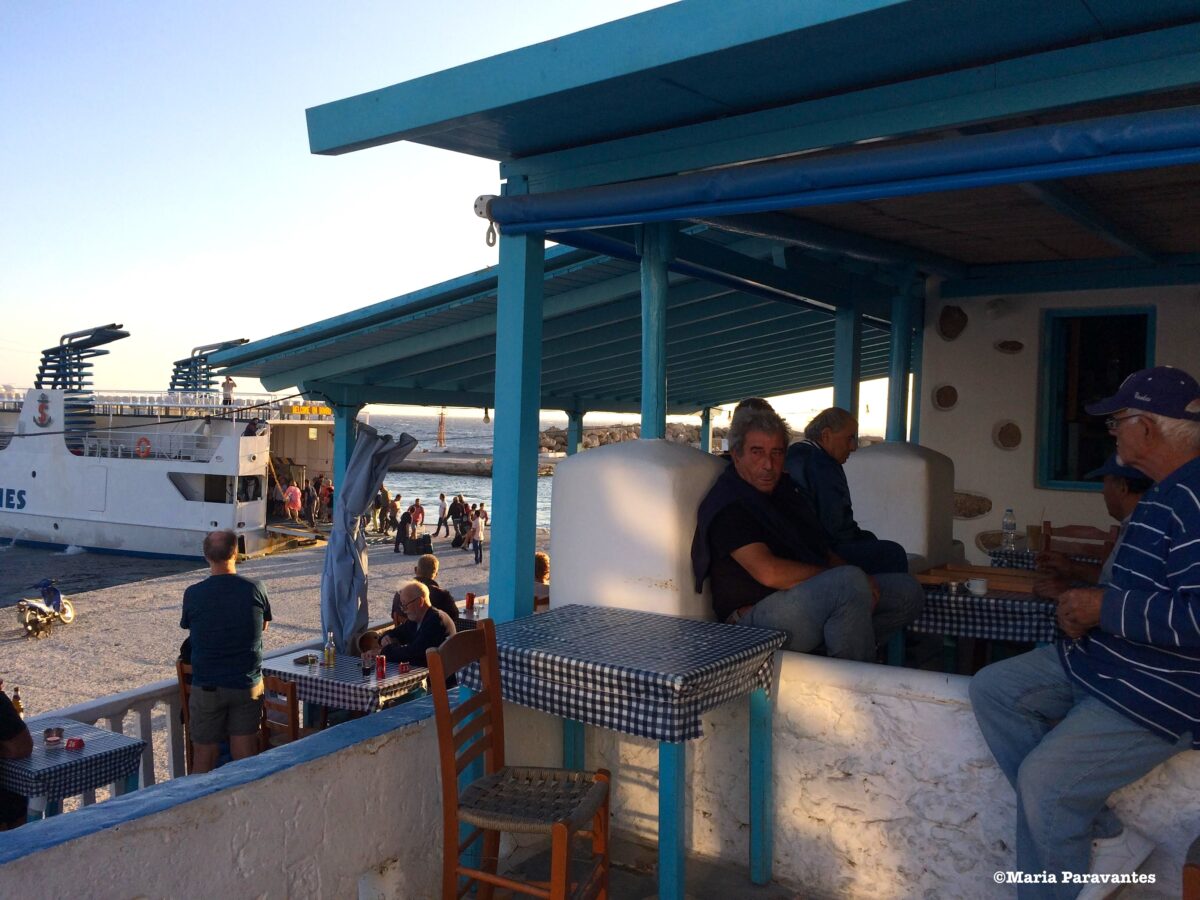
Q: Can I take a rental car or scooter on the ferry?
A: Yes, but you will have to book a vehicle spot in advance and make sure your rental company is OK with it. Unless you have some super deal, it is better to rent a car or scooter on the islands you visit.
One reason I would avoid (at all costs) taking a car on the ferry is being faced with the nightmare of boarding and parking under the screaming guidance of the scary sailorman. Even if you do manage to keep your calm (rare), you will have to park your rented vehicle a centimeter from the one next to you and get out before someone else parks next to you. Good luck with that!
Q: Can I bring luggage onboard?
A: Absolutely. Most ferries have a large luggage storage area when you board. You can also bring smaller bags with you to your seat.
Q: Can I bring a pet on board the ferry?
A: Yes, conventional ferries also have kennels for dogs although I have never left my dog in one. The noises can be scary for most animals. I would just sit with my fury friend outdoors on the deck. These ferries also offer cabins for pet owners – a more expensive option but worth every penny if the trip is long. This is relatively new, I remember sleeping on the deck more than a decade ago because pets weren’t allowed inside the cabins. I once snuck my puppy in using a hand bag! Those were the days!
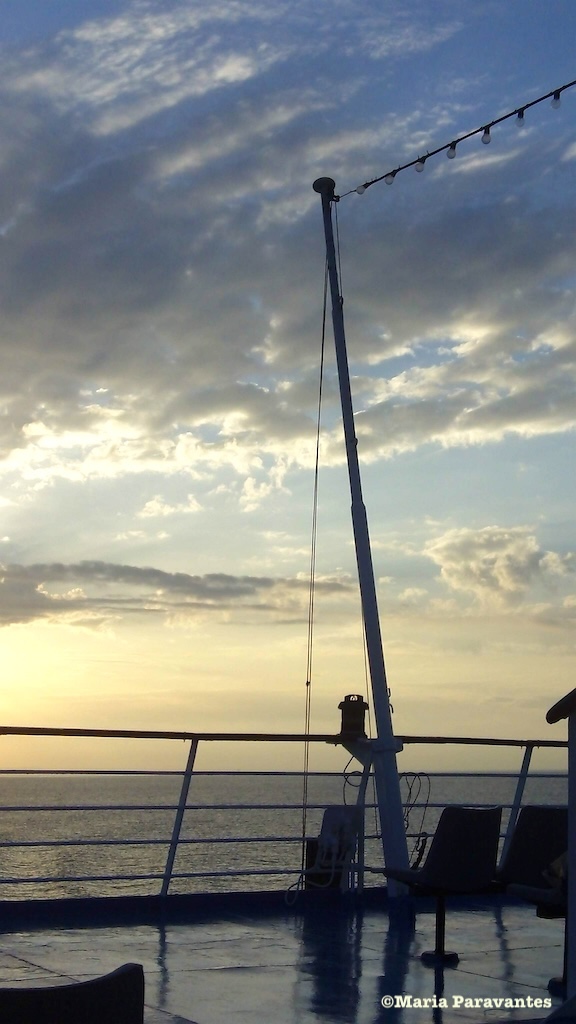
Q: Will I find food on board the ferry?
A: Yes. Some 30 years ago, I remember the food and coffee were terrible and expensive. Today, you’ll find popular coffeehouse chains, snack bars and even restaurants on larger ferries like the ones going to Crete. They also accept credit cards. However, I still make my own sandwiches + chips and bring my own coffee to relive the fun of my childhood Greek vacation time experience! You can also buy cheaper snacks from the port.
Q: Are seats assigned on Greek ferries?
A: On high-speed ferries, yes. On conventional ferries, it depends on the ticket class. Some economy areas are open seating.
Q: Can I book a cabin?
A: Yes, on ferries going to far-off islands like Crete, Samos, Limnos, etc, you can book a cabin. Prices change depending on number of passengers, time of the year, interior (no window) or exterior cabin. Some companies offer discounts for families and have pet cabins for your furry friends – make sure to ask.
Q: Will I have Wi-Fi during my ferry ride?
A: To be very honest: I wouldn’t rely on it. Yes, maybe for some scrolling. But if you plan to work or make some Zoom calls, no. The free version is turtle nerve-racking slow and the paid versions are not reliable in the Aegean Sea.
Q: Can I walk outside during the trip or is it all indoors?
A: The conventional ferries have outdoor spaces and several floors. I personally prefer sitting outdoors. Fresh air and things to see. I love the action, keeps me occupied. High speed ferries and Flying Dolphins are only indoors in assigned seats.
Q: Will I get seasick?
A: Most people don’t get seasick particularly on conventional ferries which can handle choppy waters. If however you tend to get sea sick, avoid the Flying Dolphins/Cats and smaller boats. The smaller, the bumpier the ride.
If you happen to be traveling in rough winds, sit near the center of the boat, avoid reading or eating and look at one steady spot. I remember one year, a group of seasoned islanders had suggested I eat just a few potato chips or salty crackers and one sip of Coca Cola. It really works! You could take motion-sickness pills if you’re prone to nausea. But you will have to take the pills 20 to 30 minutes before boarding for them to work. One downside: although they do the trick, you end up feeling very sleepy once they wear off.

Q: Greek ferry boarding etiquette?
A: I don’t know how to explain this… but there is none nor are there rules. Expect the Wild West! It’s the very Greek attitude of “let’s all run in and grab all the seats inside and out just in case we need more even though we have assigned seats.
This is sadly a remnant of past days when there were no seats assigned and we’d be traveling at night so everyone was eager to get what we call a “kavantza” – a safe warm spot to spend the night. Apparently, this sense of urgency and mayhem is in our genes!
The truth is, if you’ve been dreaming of sitting on the deck, it is best to be there earlier so you can sit on the side that has shade.
The very same madness, if not worse, applies to disembarkation. Once the ship arrives to the port, everyone now tired and eager to get out sprints to their cars or wait in the ship hull in front of the massive door with all their suitcases, pets, bird cages, bikes, etc to open. Not a great feeling, especially when all the car drivers turn on their engines (god knows why) and just sit there. In any case, be patient and do know that there may be some pushing and shoving, so be prepared. Welcome to the Greek ferry experience!
Q: What should I know about disembarkation at island ports?
A: It is always a good idea to listen to the captain speaking. Speakers on ferries, especially if you are sitting outside, can hardly be heard. So be aware of the island stops and the announcements. Like I said before, Greek captains are notorious for arriving at ports, picking up cars and travelers and leaving in minutes. That’s how I discovered my favorite island years ago. I missed the actual stop and ended up getting off on the next island. No prebookings in those days to worry about!
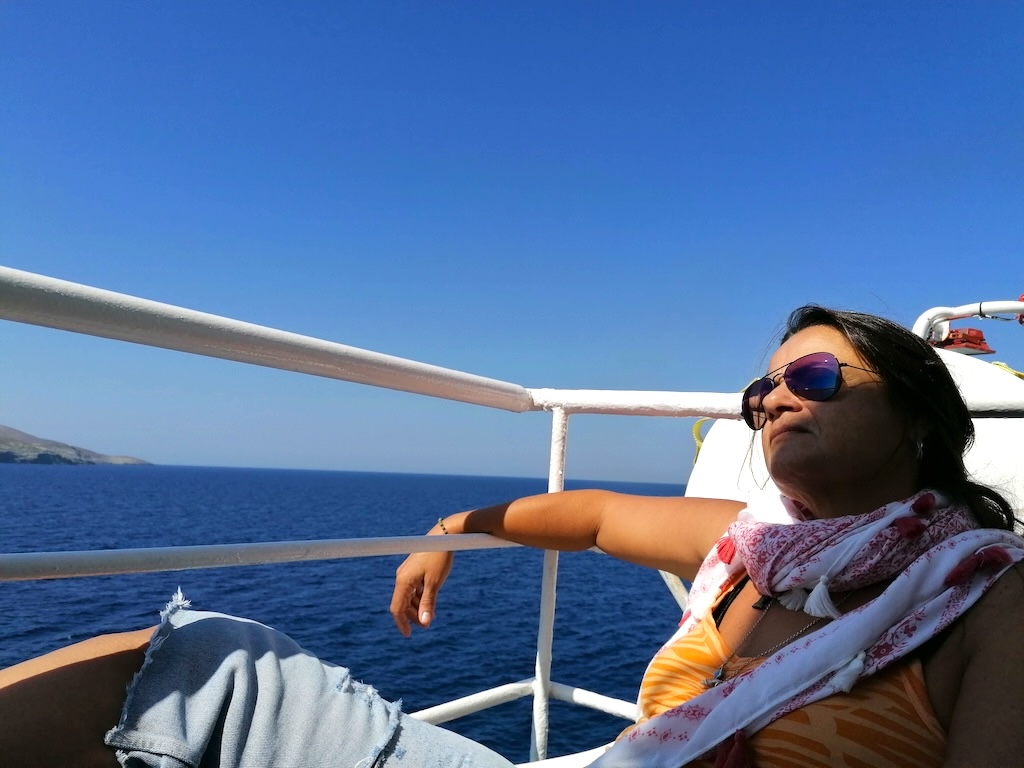
Q: What should I bring with me on the ferry?
A: These are the eight things you will need when traveling with a Greek ferry
1) sunscreen: this is my absolute favorite and not sticky or gooey
2) hat with tie for the wind: this hat is the one I’ve been using on all my trips plus camping.
3) headphones or ear pods to listen to music: I love my Air Pods but I also have a pair of JBL headphones for more comfort. For a cheaper option I would go with these, they are have noise isolating option and are made of and sustainable materials
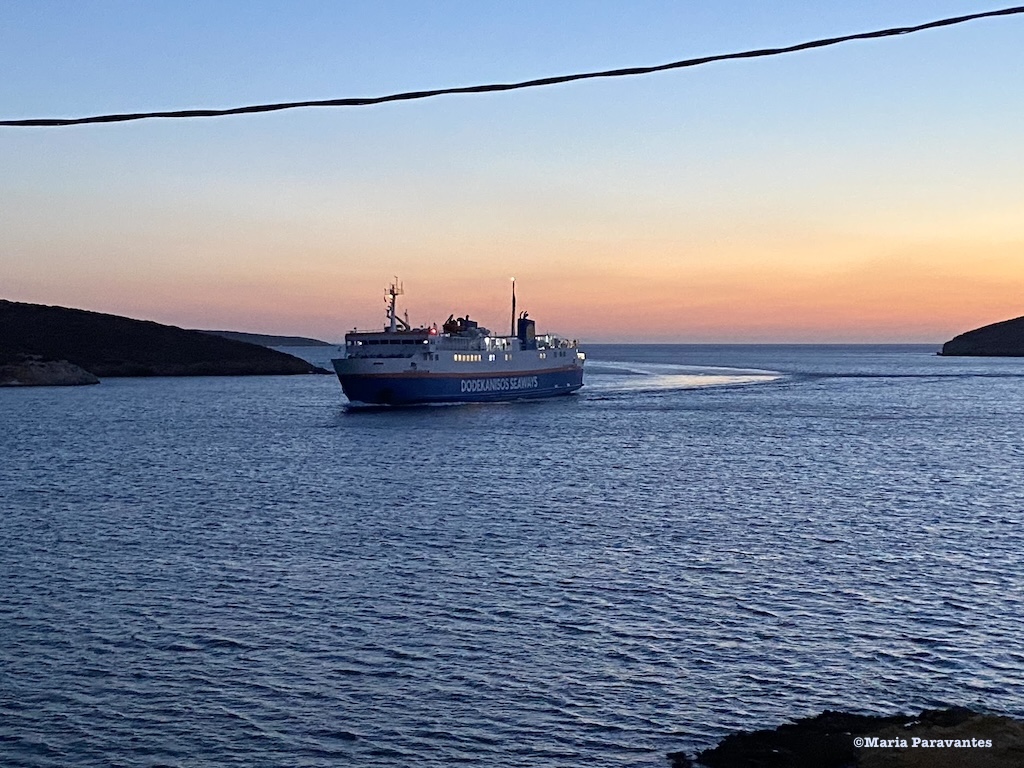
4) a book or kindle
5) a neck warmer: I go nowhere without my Buff for summer or a warmer winter warmer with fleece. You will need this especially if you’re traveling early in the morning or late in the evening or at night however hot it may in the day!
6) a good windbreaker: this one is a very good choice and light weight
7) hand wipes: these are perfect
8) sunglasses: totally necessary and totally personal. I have always worn Raybans and opted for the classic aviators and of course the iconic Wayfarers, which may be heavy at times
9) water bottle: this one is ideal for travel and collapsible
10) a good power bank: this is the ultimate charger and I use it for my demanding journo trips. However, for a more budget friendly choice, totally portable, and great for travel, this is the choice.
You can also read my Off to Greece? Make Sure to Pack These Useful Items post for more!
Last piece of advice, the Greek ferries experience is one you’ll never forget. It is however a very integral part of the Greek island experience and of Greek summer. If you could go with the flow, be patient and have faith, it will be worth your while. I’ve made the best of friends on long ferry rides to the islands, found my calling, danced and sang with other travelers.
👉🏼 Dream of visiting Greece? Start planning
♫ I end today’s post with the ultimate Greek island song performed here by Santorini-born artist Mariza Koch. “Mes tou Aegeou”– a traditional Greek island song about the beauty of the Aegean Sea and its wonderful islands.
Enjoy!
Enjoyed this Post? Share and Pin it!
